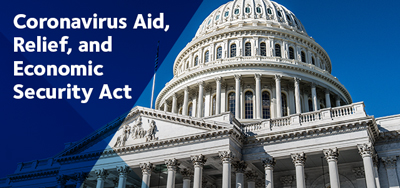By Charles Ouslander, Senior Staff Attorney / PABSS Coordinator
For people with disabilities, the Covid 19 pandemic has been a difficult and stressful time. Aside from health and safety concerns, there has been confusion around how public benefits have been affected by the crisis. People are also unclear about what new programs have been created to help support those who have lost a job or had their social security benefits interrupted.
Typically, unemployment insurance benefits are available in each state to those people who lose their employment. For example, the person who’s been laid off from their position, quit for good reason or was fired for any reason, other than serious misconduct or reckless behavior, is entitled to receive unemployment benefits. Each state has its own rules, and most states require persons seeking unemployment benefits to search for full-time work. In New Jersey, if your claim for unemployment is based on the loss of full-time employment, you must be looking for full-time employment. Of course, if you find part-time employment, you must report those wages to the Division of Unemployment Insurance, and you may still be eligible for partial benefits.
Due to the staggering job losses during the pandemic, Congress established three new unemployment programs that increased unemployment benefits in both coverage and amount. The programs apply to specific groups of people and have different criteria for eligibility. These programs were part of the Coronavirus Aid, Relief, and Economic Security (CARES) Act:
• Pandemic Unemployment Assistance (PUA) – This program provided unemployment benefits for workers, including those who are employed part-time. People seeking PUA must certify that: 1) they are unemployed either full-time or part-time, or 2) unable and unavailable to work because of a circumstance or situation related to the Covid 19 pandemic. Many in the disability community work part-time due to their disability and/or receipt of social security benefits (i.e., substantial gainful activity or resource limits). This program broadens eligibility, to cover such workers. PUA officially ended on September 5, 2021, as Congress did not reauthorize the law.
• Federal Pandemic Unemployment Compensation (FPUC) – This program increased the amount of benefits for state unemployment insurance programs and the PUA by an additional $600 per week. The additional amount was available from the date the CARES Act was enacted, March 27, 2020, through July 26, 2020. It was subsequently extended to March 31, 2021. The American Rescue Plan Act of 2021 continued the extension of additional unemployment benefits, but reduced the amount from $600 to $300 per week. The additional unemployment benefit of $600 expired back on July 31, 2020. The authorization for the reduction in the amount of additional unemployment benefits to $300 started on December 26, 2020. This program officially ended on September 5, 2021, as Congress did not reauthorize the law.
• Pandemic Emergency Unemployment Compensation (PEUC) – This federal program provided state unemployment benefits through a series of extensions which increased benefit coverage from an initial 13 weeks up to 53 weeks. This program officially ended on September 5, 2021, as Congress did not reauthorize the law.
Unemployment Insurance and Its Impact on Social Security Benefits
How do these pandemic unemployment programs affect social security benefits for people who are disabled and receive both unemployment and social security benefits? The good news is that they don’t!
Supplemental Security Income
The Social Security Administration (SSA) has provided an emergency message that receiving these unemployment benefits will not cause loss of social security benefits, such as Supplemental Security Income (SSI).[1]
For those receiving SSI benefits, all of the above described unemployment benefits through the CARES Act and subsequent extensions, will be characterized as “disaster assistance” and not income or resources. Ordinarily, unemployment benefits are considered “unearned income” and these benefits could cause an SSI recipient to possess too much in income and/or exceed the resource limit that SSI beneficiaries are allowed to possess each month (i.e., $2,000 for individuals and $3,000 for couples).[2] The good news here is that both regular and pandemic unemployment benefits will not be counted as either income or resources, during the pandemic period.
Social Security Disability Insurance
For those persons receiving SSDI benefits, the CARES Act unemployment benefits, and their extensions, will not be counted as income, for purposes of determining substantial gainful activity (SGA) when receiving continued SSDI benefits.[3] Unemployment income counts as unearned income, not as earned income so the substantial gainful activity (SGA) income limit does not apply. Unemployment benefits are considered “unearned income” since no actual work is being performed to obtain this income. Unearned income is all income that is not earned such as Social Security benefits, pensions, state disability payments, unemployment benefits, interest income, dividends and cash from friends and relatives. Under the SSDI program, unlike SSI beneficiaries, SSDI beneficiaries are limited only in the monthly amount of “earned income” they may acquire through employment (i.e., SGA). [4]
The bottom line is that receiving enhanced or continued unemployment benefits during the Covid 19 pandemic should not cause an interruption of your SSI or SSDI benefits. Of course, it is important to keep records and copies of any documents from both the SSA and your state unemployment office. This way you can prove what benefits you have received, how much and for how long, if there is ever a dispute down the road.
[1] https://secure.ssa.gov/apps10/reference.nsf/links/07232021123646PM (Effect of COVID-19-Related Financial Assistance on SSI Income and Resources), Program Operations Manual System (POMS), SI 00830.230 Unemployment Insurance Benefits.
[2] See, https://secure.ssa.gov/apps10/reference.nsf/links/07232021123646PM and https://secure.ssa.gov/apps10/reference.nsf/links/07232021011154PM (Special Processing Instructions for Applying Supplemental Security Income (SSI) Income and Resource Exclusions to Pandemic-related Disaster Assistance).
[3] https://secure.ssa.gov/poms.nsf/lnx/0500830230 , Program Operations Manual System (POMS), SI 00830.230 Unemployment Insurance Benefits.
[4] SI 00830.230 Unemployment Insurance Benefits, Program Operations Manual System (POMS),
